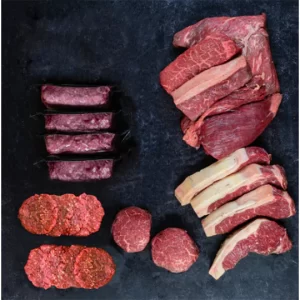Nutrient Dense Beef is virtually the opposite of empty calories. A Nutrient Dense Beef is rich in nutrients. Compared to a dense food that is higher in calories. It has an average of 10 essential nutrients like zinc, iron, and B vitamins.
When it comes to quality protein, Nutrient Dense Beef is the healthy choice, and it offers a powerful nutritional quality. Having more necessary nutrients in a smaller serving size compared to other protein sources, beef stands out as the best choice. This superior nutrient outline includes not only iron but also important vitamins, minerals, and amino acids vital for overall health and well-being. Watch this video below for more information:
Order now to get your Nutrient Dense Beef:
Typical Problems When Buying Beef at the Grocery Store
When it comes to buying beef at the grocery store, there are several day-to-day problems consumers face:
1. Lack of Clarity:
- Unconfirmed Information: It can be hard to know exactly where beef comes from, including the farm and how the animals were raised.
- Missing Product Details: Labels can be confusing, with unclear terms that may not tell us enough about the beef’s quality, where it came from, or how it was produced.
2. Quality Concerns:
- Hormone and Antibiotic Use: Many grocery stores’ beef products are raised with hormones and antibiotics, which can raise concerns about health and environmental issues.
- Substandard Cuts: Some grocery stores may sell lower-quality cuts of beef that are tough or lack flavor.
3. Price Fluctuations:
- Seasonal Variations: The price of beef can fluctuate significantly based on seasonal factors, making it difficult to budget for purchases.
- Hidden Costs: Additional fees or charges may be added to the price of beef, such as packaging or processing fees.
4. Behavioral and Eco-Friendly Issues:
- Animal Well-being: Good animal welfare is about keeping our livestock healthy and well-treated on the farm. It requires disease prevention and treatment, proper care, proper housing, nutrition, humane handling, and a veterinarian’s location.
- Environmental Changes: We must ensure a safe and wholesome food product to consumers. We want to minimize environmental change and focus on improving the environment with proper policies and regulations. To meet this challenge, most producers will not need to make major changes in their operations. If not managed properly, some beef production operations will lead to public concern.
5. Choosing the Best Cut of Beef:
- Limited Specialty Cuts: When you know the kind of cuts it helps in selecting the right meat for specific recipes. Different cuts have special textures and flavors, which can affect the outcome of a dish.
- Consistency Within: Factory Production beef often lacks the special qualities and tastes of grass-fed, lean, or livestock breeds. They lack the traits of grass-fed livestock that contribute to the beef’s sustainability, fertility, disease resistance, and lifespan.
These issues can make it difficult for consumers to find quality goods and services at the grocery store. For instance, they can research different brands, look for certifications, and ask questions to ensure they are purchasing products that align with their values.
The land where cattle graze is vital for producing nutrient-rich beef. A diet of many different grasses and pastures, grown on healthy soil, greatly affects the meat’s nutrition. By understanding the link between the land, the animal, and the final product, people can make smart choices about the beef they eat.
Nutrient-Rich Dense Beef: A Closer Look
- Building the Health of the Soil: Regenerative farming is a technique that increases the health and diversity of your soil. Well, you use a system like crop rotation, cover cropping, and limited tillage. This helps you return the soil to a healthy, fertile state and it also improves water retention. But the best part is that all of these practices benefit the environment and help you produce food that’s more nutritious and higher quality.
- Livestock Welfare: It is very important to treat farm animals with respect. By doing so, not only are you ensuring the quality of the product, but you are also helping to promote the well-being of an entire community.
- Tracing the Process: By supporting beef producers who invest in product tracking systems, we can foster greater consumer trust and confidence in the meat supply chain.. This is a good thing because it allows consumers to make more informed choices about the food they eat.
- Consumer Education: When it comes to picking out meat, there’s more to consider than flavor or cut. In addition to positively affecting the health of the land and the animal, ethical and renewable beef production can also contribute to human well-being. By raising awareness of how healthy land equals healthy livestock equals delicious, safe, high-quality meat, consumers can choose products that support environmental upkeep, animal welfare, and human health.
Beef is nutrient dense, and beef production has an effect on the environment and on humans’ health. By making sure it is raised sustainably and ethically, we can ensure that it’s available for everyone. These three principles are crucial to consider. Keep this in mind, and you can positively impact our environment, animal well-being, and health. But the first step to making a difference is to educate yourself about the industry.

